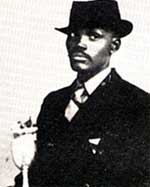This Day in History: October 8, 1962
Additional Date: October 8, 1962
On 8 October 1962, Solomon Linda, the singer and composer of Mbube, which became the pop hit as 'The Lion Sleeps Tonight', died without receiving royalties for his work. Linda was born in Pomeroy in rural KwaZulu Natal in 1909, and went to Gordon Memorial Mission School. At the school, Linda was exposed to different music genres through church music and choir contests. He also witnessed a visiting group of African Americans from the United States, the Jubilee Singers. Linda showed a keen interest in music and fused these into Zulu songs that he wrote and sang with his friends at weddings and events around the community. In the early 1930s, Linda moved to Johannesburg where he worked at Mayi Mayi furniture shop in Small Street in 1931, before moving to work at the Carlton Hotel in 1933. He began singing with his uncles and later started a group known as Solomon Linda and the Evening Birds. Their performances at weddings and choir competitions made them popular around Johannesburg. In 1938, Linda and the Evening Birds recorded several songs in Eric Gallo's recording studios with the assistance of a talent scout. By 1949, Mbube had sold over 100,000 copies, making Linda a musical star in South Africa. Although Mbube is Linda's best known recorded song, he composed and recorded other songs as well. Some songs such as Yetul' isgqoko" (Take off your hat) and Sikhalela izwe lakithi (We mourn for our country) carried political undertones protesting against the oppression and the harsh life experienced by Black South Africans under colonial rule. Linda sold his rights of the song Mbube to Gallo Record Company for 10 shillings. Since South Africa was still a British Colony when the rights were sold, under the Dickens Clause in British Law, all rights were supposed to revert to his heirs after 25 years of his death. The heirs would then be entitled to those rights and be in a position to renegotiate any future deals. This did not happen and Linda's work was recorded and modified by other music artists. This left the possibility of pursuing a lawsuit in the future. An American musicologist Alan Lomax discovered the original South African recording of "Mbube" and he gave it to his friend Pete Seeger, who belonged to a folk singing group The Weavers. Seeger renamed the song "Wimoweh" and the Weavers recorded the song in 1952. The song became popular in the US and George Weiss rewrote the song and entitled it 'The Lion Sleeps Tonight.' Since then the song has been recorded by over 150 artists for example, the Kingston Trio, The Tokens, Robert John, Tight Fit, Jimmy Dorsey, Glen Campbell among others. The song has also featured in films such as 'Ace Ventura: Pet Detective', and 'The Lion King'. After collapsing on stage in 1959, Linda was diagnosed with a kidney disease. He died on 8 October 1962 in poverty without receiving benefits for his talent. In 2000, a South African journalist, Rian Malan, wrote a feature article for Rolling Stone Magazine that told the story of Solomon Linda. Malan estimated that his song 'Imbube' had earned an estimated 15 million American dollars for its use in "The Lion King" alone. In 2004, Solomon Linda's surviving daughters Delphi, Elizabeth and Fildah backed by Gallo Records brought a lawsuit against Walt Disney for using his song 'Imbube' in "The Lion King" movie and stage musical without paying royalties to them. The lawsuit was finally settled in February 2006 with Linda's daughters receiving an undisclosed amount.
